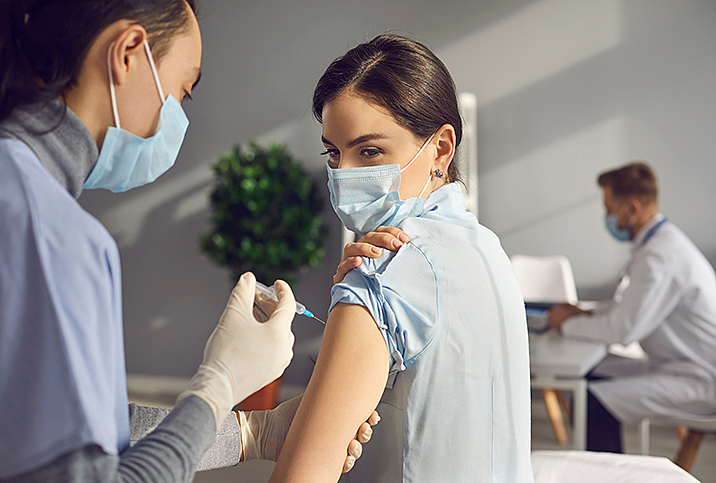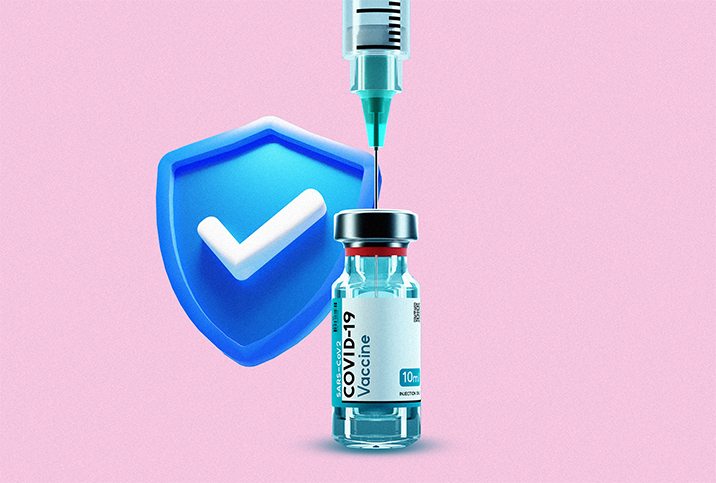How Can You Tell You Have COVID-19, and What Do You Do Next?

For most of us, COVID-19 became part of our daily lives in January 2020. Suddenly, for a time at least, society changed. There were new restrictions when it came to public gatherings, mask mandates and unanswered questions that permeated through the United States.
Although things have slowed since the early stages, it's likely the Coronavirus will always be present, even as people become more educated and vaccines become more commonplace.
Still, questions remain around this ever-changing virus—what are the symptoms of COVID-19, how can you tell if you've contracted it, and if you have, what do you do next? Also, how does the virus affect sexual health?
Common symptoms of COVID-19
Once contracted, the coronavirus passes through different phases, explained Manoj Gandhi, M.D., senior director of medical and scientific affairs at Abbott Diagnostics in San Francisco.
"Generally, patients with COVID-19 start with an incubation phase followed by an acute phase and a recovery phase," he said. "The incubation phase is the time between getting infected and when symptoms appear. This phase can last anywhere between two to 14 days after exposure to the virus. The acute phase is when symptoms appear, ranging from mild symptoms to severe illness."
The general timeline of those symptoms, along with recovery, is different for each individual.
According to Dung Trinh, M.D., a physician with MemorialCare in California and the chief medical officer of Healthy Brain Clinic in Long Beach, California, the most common timeline of symptoms is as follows:
- Day 1-2. Fever, fatigue, muscle pain
- Day 3-4. Dry cough, shortness of breath
- Day 5-6. Sore throat, headache
- Day 7-8. Loss of smell or taste
- Day 9 onward. Chest pain or pressure, confusion (if symptoms are severe)
Not all cases manifest identically, however. Rarer symptoms such as colorful lesions on hands and feet or diarrhea and appetite loss have also been exhibited.
How do you test for COVID?
There is still a vast landscape of COVID testing, according to Trinh.
"The most common test is the PCR (polymerase chain reaction) test, which is highly accurate but may take several days to produce results," he said. "Another type of test is the antigen test, which is faster than the PCR test, producing results in as little as 15 minutes, but it may not be as sensitive and accurate. These tests are usually available at big chain stores such as CVS or Walgreens."
How Do PCR Tests Work?
PCR tests begin by detecting the genetic material of the SARS-CoV-2 virus through a swab of the nose or throat. They extract RNA (ribonucleic acid) from any virus particles that may be present, according to Trinh.
"The RNA is then converted into DNA (deoxyribonucleic acid) [and] small fragments of DNA that match specific sequences of the SARS-CoV-2 virus are amplified," he said. "If there are enough copies of the viral DNA present in the sample, [this indicates] that the patient has COVID-19."
Can the results of a PCR test be wrong?
PCR tests are precise because they create hundreds of thousands of DNA copies by which the virus can be detected. That strength can also be a downfall, however.
"As the copy is made in the amplification cycle, fluorescent dyes are attached to the sequence," Gandhi said. "The amplification cycle is then repeated 20 to 30 times to create hundreds of thousands of DNA copies corresponding to the SARS-CoV-2 viral RNA, which can then be detected by the instrument.
"Because PCR tests involve amplification, PCR tests can detect the virus in the early phases of infection before the patient presents any symptoms [and] even at later stages when the patient no longer shows symptoms and may not be considered contagious," Gandhi said.
How do COVID antigen tests work?
Antigen tests get their name from their detection of a viral protein—also referred to as an "antigen." The antigen binds to what's called a detector particle, which generates a signal that can be seen visually, similar to a pregnancy test, according to Gandhi.
However, these tests aren't as sensitive as PCR tests because they don't go through the amplification process. They can, therefore, produce false negative results.
Why do antigen tests provide false negatives?
False positives occur if the test detects genetic material or proteins that resemble those of SARS-CoV-2 but are from a different virus or bacteria, according to Trinh.
As COVID-19 belongs to a larger family of illnesses and the test is often taken at home where it can be mishandled or contaminated, it's entirely possible for a patient to be misdiagnosed.
"False negatives can occur if the patient is tested too early after being infected when viral levels are still low, or if the swab is not collected correctly," Trinh said. "It's important to follow public health guidelines even if you have tested negative for COVID-19 because a negative test result does not necessarily mean you do not have the virus."
An antigen test could also provide a false negative if a person is asymptomatic, according to Gandhi. The visual determination of the result may also cause issues.
"The results can be misinterpreted (false negative or false positive) based on the intensity of the signal and the visual acuity of the reader," Gandhi said.
As with many elements of health, getting tested is best done frequently.
When should you see a doctor for COVID?
While earlier is always better, it's never too late to seek medical care, Trinh said.
"The reason to seek medical attention for coronavirus as symptoms start to worsen is to prevent these severe complications," he said. "The likelihood of a severe case decreases as treatments such as Paxlovid and remdesivir are given early."
Even if the virus is causing great discomfort, symptoms can always get worse due to mismanagement.
In the future, receiving treatment and taking preventative measures may become a professional prerequisite, according to Nicole Hassoun, Ph.D., a professor of philosophy at Binghamton University in New York.
"There have been developments on mandated vaccine reporting in the workplace," she said. "Vaccine mandates, even for health workers, are contentious and continually subject to litigation."
Recently, for instance, a federal court overturned a Montana law intended to prevent employers from knowing the vaccination status of employees.
What happens if COVID goes undiagnosed?
Anyone who comes down with the coronavirus needs to be treated or they run the risk of much more dire consequences, according to Brian Labus, Ph.D., an assistant professor of epidemiology at the University of Nevada-Las Vegas.
"Both treated and untreated COVID can lead to complications that require hospitalization," he said. "While treatment can reduce the risk of severe disease, people still can become very ill, even with treatment."
There's a grim path patients who don't seek treatment for the virus can take, according to Soumi Eachempati, M.D., co-founder, CEO and chief medical officer of CLEARED4, a health IT platform based in Miami.
"Complications of severe coronavirus can be extensive and even include death [due to] heart failure from severe sepsis, pulmonary failure from extensive lung inflammation [or] kidney failure or liver failure," he said.
Labus offers elemental advice when it comes to deciding when to see a healthcare professional.
"You know your body better than anyone else, so you need to listen to it," he said. "If you keep getting worse or have symptoms that are not improving over time, or are in a high-risk group for severe disease, you should seek medical care. If you have chest pain, difficulty breathing or problems like confusion, you should seek medical attention immediately."


















